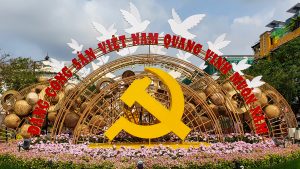Vietnam’s National Assembly accepted yesterday the resignation of its chairman Vuong Dinh Hue, who last week became the latest top official to step down in connection with the intensifying anti-corruption campaign.
Hue, 67, tendered his resignation on April 26, days after his assistant Pham Thai Ha was arrested on charges of abusing his position and power for personal gain.
The resignation came a month after President Vo Van Thuong stepped down, just over a year after the previous president, Nguyen Xuan Phuc, resigned to take political responsibility for corruption scandals connected to Vietnam’s COVID-19 response.
In an extraordinary session yesterday, the National Assembly appointed Hue’s deputy, Tran Thanh Man, as his temporary replacement. Man holds a doctorate in economics and sits on the Politburo, the Communist Party of Vietnam (CPV)’s highest level decision-making body.
The successive resignations leave Vietnam with no permanent holders for two of its “four pillars,” as the country’s top leadership positions are known. It has also hollowed out the Politburo, which has lost five of its 18 members due to corruption-related resignations and dismissals.
The National Assembly is set to hold a regular month-long session beginning on May 20, when it will likely announce its permanent replacements for Hue and Thuong. The decision is closely intertwined with the leadership tussles that are already occurring in advance of the next Party Congress in early 2026.
The Congress is almost certain to see the resignation of the party’s General Secretary Nguyen Phu Trong, who has served in the post for an unprecedented three terms and is now 80 years old and in poor health. His successor remains at this point unclear, but the choices of Hue and Thuong’ replacements will likely have a significant bearing on who ends up getting the post in 2026.
With an increasing number of high-level figures taken out of action by the anti-graft campaign, however, the number of possible contenders for the Party leadership is dwindling. To be eligible to serve as CPV general secretary one has to have served two terms on the Politburo. While the Party reserves the right to bend the rules in adverse circumstances, there are now just three candidates eligible for the top job: Truong Thi Mai, the head of the CPV’s Secretariat, who is tipped as a replacement for Hue as National Assembly chairperson; Prime Minister Pham Minh Chinh; and To Lam, the powerful minister of public security.
In a recent article for Radio Free Asia, Zachary Abuza of the National War College in Washington, D.C. argued that the current frontrunner is Lam, in large part because he controls the security apparatus that has been responsible for spearheading the anti-corruption crackdown. While the “blazing furnace” campaign has been entwined with political rivalries since the beginning, Lam, partly to detract attention from his own scandals, has taken a leading role in the anti-corruption campaign, and “in the process, weaponized corruption investigations to take down his political rivals,” Abuza wrote.
“In many ways, Lam is the least qualified but the most secure,” he added. “He has something that none of his rivals have: the vast investigative powers of the [Ministry of Public Security], which he uses with great dispatch as he strategizes to be the last one standing.”

































